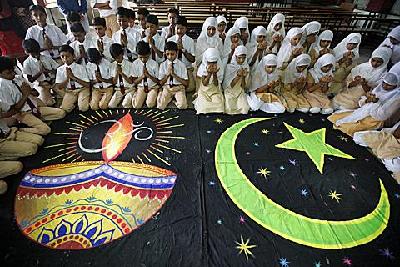
Traditional Islamic schools, known as madrassas, have gotten some negative attention in recent years. In Pakistan and Afghanistan, some madrassas are accused of stoking Islamic fundamentalism and militancy. In India, a new kind of madrassa is emerging – where tolerance and secularism are valued over orthodoxy. One such "model madrassa" is in the state of West Bengal.
A school in Orgram, in the Indian state of West Bengal, has something unusual to boast about.
It is the only Islamic madrassa in India - and probably in the world – where Muslims are in a minority.
More than 60 percent of the students here are Hindus. Parents from the surrounding village say they prefer the school to other choices for its moderate, inclusive approach to education.
Educational materials and food are provided to the students free of charge and the co-ed curriculum includes plenty of math, science and practical skills like using computers.
Courses in Arabic and basic Islamic theology are core requirements for every student – but that is about as far as religious instruction goes.
This young student says a lot of his Hindu friends tease him, saying, how could a Hindu study at a Muslim madrassa? He says he tells them they are wrong – that this modern madrassa is meant for students of all religions. He tells them he can study in a madrassa and still remain a Hindu.
A young female student says she has not found Islam to be any different from Hinduism, in that they both preach the same message of peace. After studying here, she says she has come to know Islam closely and it has brought her closer to Muslims in society.
The Orgram madrassa was recognized in 2008 as one of more than 500 so-called "model madrassas" in West Bengal, eligible to receive backing from the government. The schools hope to stand in contrast to more ideological madrassas, particularly in nearby Afghanistan and Pakistan that are often criticized for fueling extremism and militancy.
Muslims make up more than 13 percent of India's billion-plus population. Headmaster Anwar Hussain says his school offers a new tool for teaching Hindus and Muslims to transcend their often violent history.
He says the school sometimes invites Muslim and Hindu parents to seminars to promote increased Hindu-Muslim interaction. Muslims, especially Muslim women, who are known to be more conservative, are encouraged to step forward and interact. He says in that way, the madrassa plays a big role in maintaining communal harmony.
Hussain says the school fosters a spirit of equality – be it religious or economic.
He says the students from all Hindu caste levels attend the school and mingle with no differentiation. He says, if a low caste Hindu student has gathering at his home, often upper caste Hindus will attend. Likewise, high level, or Brahmin, students extend invitations to low caste Hindus and tribal students. Hussain says caste division and untouchability are a thing of the past among the students.
But not everyone is praising the model madrassa.
Sami Mubarak is the Imam at this Calcutta mosque, and the vice chairman of a national Islamic organization.
He complains there is no mosque at all on the premises and Muslim pupils and teachers cannot offer prayers. He calls that utterly wrong and unacceptable.
Conservative Muslims also have a problem with the school's policy of putting boys and girls together in the same classroom.
He says, if boys and girls study together in a class after six years of age, all kinds of troubles arise. He says Islam commands their separation, after they turn seven. He insists co-ed classes for older students are forbidden by Islam.
But teachers at the Orgram Madrassa say both genders have to co-exist in the real world – so students may as well start learning how to do that now. As for prayers, the school says students are free to walk just down the street to the local mosque.
madrassas: 伊斯蘭學(xué)校
fundamentalism: the practice of following very strictly the basic rules and teachings of any religion 原教旨主義(認(rèn)為應(yīng)嚴(yán)格奉行宗教原則和教義)
Brahman: a Hindu who belongs to the highest caste, in which all the members are priests 婆羅門(mén)(印度教種姓制度中最高階層成員,均為僧侶)
Imam: 伊瑪目(伊斯蘭教宗教領(lǐng)袖或?qū)W者的尊稱(chēng))
In India, you may NOT kiss the bride
英國(guó)國(guó)教會(huì)失誤致100萬(wàn)宗婚姻無(wú)效
Muslim college opens in US with hopes and suspicions
(來(lái)源:VOA 編輯:崔旭燕)
